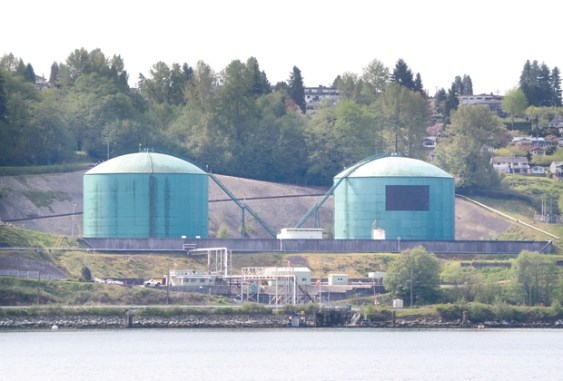The National Energy Board’s detailed route hearings for the Burnaby section of Kinder Morgan’s $7.4-billion Trans Mountain expansion project begin next week.
The meetings will be held at the Delta Burnaby Hotel from Jan. 22 to 31, and from March 12 to 22.
The oral hearings give the NEB a chance to hear from landowners who have issues with the company’s proposed pipeline route.
The federal government approved the project in November 2016 – subject to 157 conditions – along a 150-metre-wide corridor. (Once twinned, the Edmonton-to-Burnaby pipeline will carry 890,000 barrels of diluted bitumen daily from Alberta’s tar sands.)
Last year, as required by the NEB Act, Kinder Morgan filed what’s known as a Plan, Profile and Book of Reference. It included aerial maps showing the proposed location of the pipeline, and the names of “adversely affected” landowners and land occupants.
Landowners and land occupants then had a chance to submit a statement of opposition related to the location, methods and timing of construction.
“Let’s say in a rural setting, a landowner didn’t want (construction) to happen during seeding or during the harvest. That sort of issue can be brought up,” said NEB spokesperson James Stevenson.
For the Burnaby stretch of the pipeline, which is less than six kilometres long, 135 people filed a statement of opposition, he noted, and of those, 28 were granted an opportunity to speak at the detailed route hearing.
Under the NEB’s rules, the board can approve the route in segments. Work on the pipeline in any non-approved section can’t proceed until the board OKs it and all of the necessary land rights are acquired.
Appearing before the board on Jan. 21 is Underhill Lands Ltd., followed by the City of Burnaby on Jan. 22, 24 and 25. Other participants include the City of Coquitlam, Habitat for Humanity of Greater Vancouver and some Burnaby residents.
For security reasons, members of the public won’t be allowed to attend the hearings.
That’s because of the disruptions during the Energy East and Line 10 hearings, noted Stevenson, which included physical and verbal threats against attendees and participants.
“The NEB is required, under the Canada Labour Code, to provide a safe work environment, which includes inside the hearing room. Our first priority is always safety. This includes the safety of our staff, members, hearing participants and the general public who attend our hearings. We also need to ensure that all participants have an opportunity to have their concerns heard, in a respectful and courteous environment,” he explained.
Stevenson encouraged the public to follow along through the NEB’s live audio feed at tinyurl.com/NEBAudio. The national energy regulator will also post transcripts of all the meetings on its website.
What to expect at the hearing
*Trans Mountain will provide a brief opening statement about the proposed route, the criteria used in determining the proposed route and the opposed portion of the proposed route.
*Hearing participants may present a brief opening summary (maximum 10 minutes), outlining their objections and views on the proposed route, and may discuss alternate routes.
*Hearing participants will present evidence related to location and timing of construction. Topics such as individual compensation, the specific terms of easement agreements and general design will not be considered.
*Hearing participants will get a chance to cross examine Trans Mountain and its witnesses on the evidence it has filed to the NEB. The National Energy Board may also question Trans Mountain, and vice versa, hearing participants can be questioned, too.
*At the end of the hearing, Trans Mountain may give a final oral argument. Hearing participants give their final oral argument and the decision or order which they are requesting of the board. Trans Mountain will then be given a final opportunity to reply to the hearing participant’s concerns.
To read more Burnaby Now, go to burnabynow.com.



